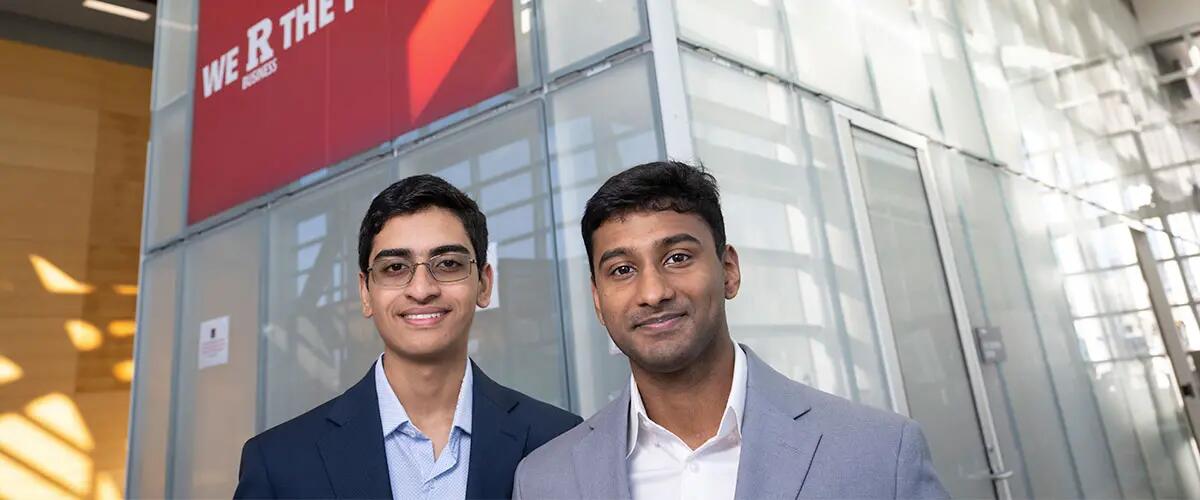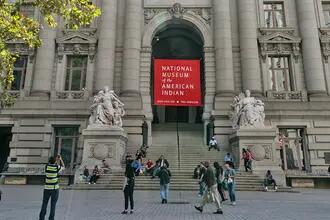
(l. to r.) Atharva Kulkarni and Aryan Gurusamy, cofounders of CarbonX, a startup that focuses on removing carbon dioxide from the central ventilation systems at schools. Photo Credit Nick Romanenko/Rutgers University
Student Entrepreneurs Aim to Capture Carbon Emissions and a Shark Tank Win
This story originally appeared in Rutgers Today on January 23, 2024.
Concerns about global warming gnawed regularly at Aryan Gurusamy, but they kicked into high gear as high school graduation approached last June, and plumes of acrid gray smoke from Canadian wildfires cloaked the Northeast.
“I kept thinking, what can I do to help address climate change?” he said.
By fall, as a first-year student at Rutgers Business School-Newark and New Brunswick, Gurusamy had come up with a concept for removing carbon dioxide from the central ventilation systems at schools. He shared the idea with fellow first-year business school student Atharva Kulkarni, his friend from Montgomery High School. The startup CarbonX took root.
In November, CarbonX competed against about a dozen other ventures in RBS’s Shark Tank Pitch Competition and emerged as one of three finalists. “They had a well thought-out plan of action when it came to their go-to-market strategy,” said Varun Bharti, president of Rutgers Entrepreneurial Society (RES). Bharti, a RBS senior, and two other students created the competition in the fall of 2021, and it has run every semester since.
Shark Tank finalists earn the opportunity to pitch their proposals to investors and venture capitalists. The stakes will be high for the Shark Tank Finalist Showdown on March 1: for the first time, winners from prior semesters will also compete. A total of $10,000 will be awarded to the top three of 11 startups, as judged by angel investors and venture capitalists, as well as Rutgers University alumni and professors, Bharti said.
“The competition has never been more fierce,” he said. The entrepreneurial society teamed up with RBS’s Road to Silicon V/Alley, a selective organization for aspiring entrepreneurs, to host the event. The two organizations recently created 1766 Labs, a student-run venture studio to accelerate entrepreneurship for non-ivy founders.
Gurusamy and Kulkarni are working to flesh out their CarbonX proposal. They are developing a computer model of a filter that will use adsorption technology to capture carbon dioxide – a primary greenhouse gas that traps heat in the atmosphere. The elements of carbon and oxygen would then be separated, preventing the carbon from entering the atmosphere. The carbon could be sold as raw material for manufacturing cement, textiles and other products, Kulkarni explained.
“The way global warming can be mitigated is through innovators like us,” Gurusamy said. The CarbonX partners chose to target schools first because “their CO2 is often overlooked,” Kulkarni said.
They created CarbonX to fight climate change, but cutting CO2 emissions in buildings where large numbers of people congregate has an added benefit. High CO2 concentrations have been shown to slow people’s cognition, and lowering the concentration can reverse that effect. Gurusamy and Kulkarni’s plans call for expanding the technology’s use to residential buildings and hospitals.
Both 18-year-olds with undeclared majors have entrepreneurial aspirations. Gurusamy has a keen interest in finance and last summer launched a podcast called “Financial Fitness Forum,” interviewing college students and young professionals about what one needs to learn to succeed in the field. He also interned at a company that screens startups for corporations looking to add innovative ventures to their portfolio.
Kulkarni has taken the lead on the technical front in CarbonX. Kulkarni's scientific interest goes back to middle school when he did cancer research while attending Rutgers Summer Scholars Program. In high school, he worked to promote the United Nations’ 17 Sustainable Development Goals (SDGs) during a two-year internship with the iStart Valley Startup Incubator. Kulkarni is also part of a research team at Rutgers investigating low-cost, low-tech ways to stop the spread of schistosomiasis, a tropical disease, in northern Senegal.
Gurusamy and Kulkarni often work on CarbonX late at night, after classes and other commitments. “This is a full, passion-driven project – and it’s fun,” Gurusamy said. He is the fundraising chair of the Rutgers University Supply Chain Association and freshman representative of RU Sangam, a club promoting South Indian culture.
As a resident of the selective Entrepreneurship and Innovation Living-Learning Community on the Rutgers University-New Brunswick campus, Kulkarni took “Introduction to Entrepreneurship” with Assistant Professor Gary Minkoff, who became a trusted mentor. “He helped us streamline the ideation procedure and develop a more concrete concept,” Kulkarni said.
Minkoff said Gurusamy and Kulkarni are very talented and motivated students.
“They have a strong appreciation for the technical challenges and complexity of the problem they are trying to solve,” he said, noting carbon capture for public schools is a currently underserved market.
Gurusamy and Kulkarni said they are glad to have their entire RBS careers to develop CarbonX. “The learning curve is quite steep. This gives us the time to experiment and fail, and develop the technology,” Kulkarni said. “The ceiling is so high for growth,” Gurusamy said.
Even if they had not advanced in the Shark Tank competition, the CarbonX cofounders said they gained a supportive community. “When we pitched, we were both nervous, but everyone was welcoming,” Kulkarni said. With Rutgers’ resources for entrepreneurs, “we can explore the true grasp and reach of the technology,” he said. “We’re both excited to see how far we can take this venture.”
By Margaret McHugh
Press: For all media inquiries see our Media Kit


